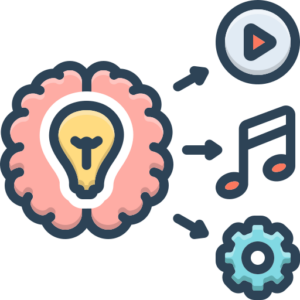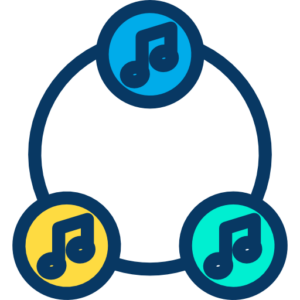Equalization is arguably the most crucial tool in any music producer’s arsenal. It’s what shapes the tone of individual tracks, carves out space in a dense mix, and adds that final polish during mastering. While high-end, premium EQs can come with hefty price tags, the good news is you don’t need to spend a fortune to get professional-quality results.
Many fantastic equalizer plugins are available today that offer incredible value, whether they are completely free or frequently available at steep discounts. This post highlights five excellent budget-friendly EQ plugins that can seriously level up your productions without breaking the bank.
Let’s dive into our top picks!
1. TDR Nova
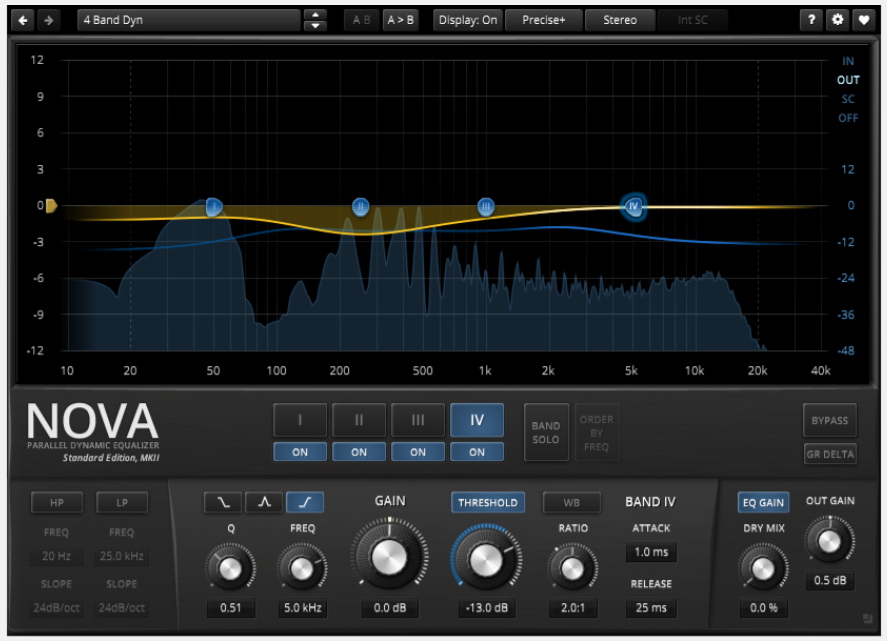
Often hailed as one of the best free plugins ever made, TDR Nova is a dynamic equalizer that offers unparalleled flexibility for its price (yes, it’s free!). It combines a standard parametric EQ with dynamic processing capabilities, allowing you to compress or expand specific frequency bands based on the input signal.
Description: TDR Nova is a parallel dynamic equalizer. It offers up to 6 bands of dynamic EQ, plus high-pass and low-pass filters. Its intuitive interface makes it easy to visualize and manipulate the frequency spectrum.
Pros:
- Absolutely Free: Top-tier performance at no cost.
- Dynamic EQ Capabilities: Excellent for taming resonances dynamically (e.g., harsh vocals, boomy bass) or adding dynamic punch.
- High-Quality Processing: Transparent sound and low CPU usage.
- Versatile: Useful for corrective EQ, creative shaping, and light mastering tasks.
- Intuitive Interface: Easy to learn and use, with a helpful spectral analyzer.
Cons:
- Can Be Complex Initially: Dynamic EQ concepts might require a little learning curve for beginners compared to static EQs.
- No Analog Emulation: If you’re specifically looking for the “color” or non-linearities of vintage hardware, Nova is a clean digital EQ.
Official Link: https://www.tokyodawn.net/tdr-nova/
2. Waves PuigTec EQs (EQP-1A & MEQ-5)
Emulations of the legendary Pultec EQP-1A and MEQ-5 hardware EQs, the Waves PuigTec EQs bring vintage analog warmth and character to your DAW. While their list price can be higher, Waves is famous for frequent and significant sales, often bringing this bundle into a very affordable range.
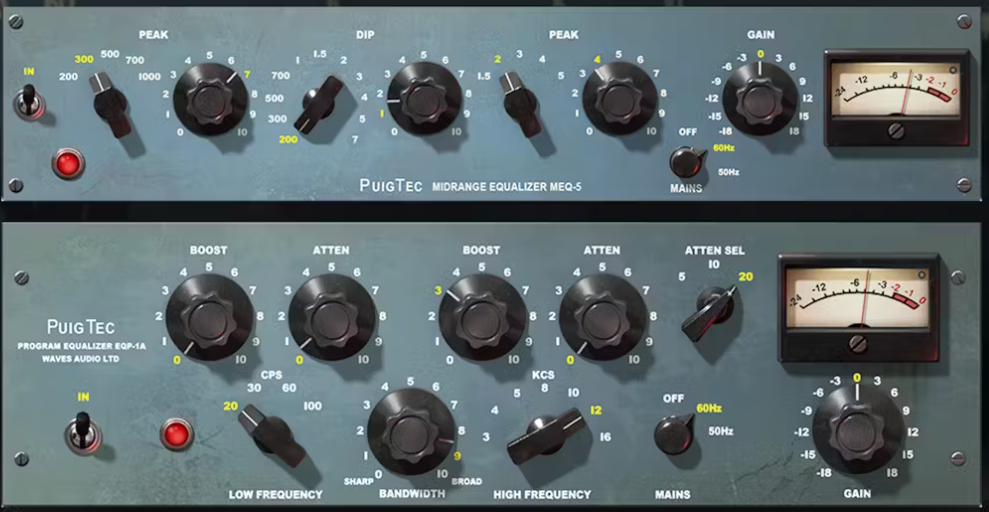
Description: This bundle includes two EQs: the EQP-1A, great for broad, musical boosts and cuts in the low and high frequencies with unique interactive bands; and the MEQ-5, designed for shaping the mid-range. They are renowned for their ability to boost and cut the same frequency simultaneously, creating a unique curve.
Pros:
- Classic Pultec Sound: Delivers the warm, musical, and highly sought-after tone of the original hardware.
- Great for Adding Color: Imparts a pleasing analog character to tracks.
- Simple and Musical: Easy to use for broad strokes that sound good quickly.
- Frequent Sales: Often available at incredibly low prices during Waves promotions.
Cons:
- Fixed Frequencies: You are limited to the specific frequency points provided by the hardware design.
- Less Surgical: Not the tool for precise notch filtering or detailed corrective work.
- CPU Usage: Can be slightly more resource-intensive than clean digital EQs.
Official Link: https://www.waves.com/plugins/puigtec-eqs (Check Waves website for current sales)
3. Waves API 550 Collection
Another fantastic emulation bundle from Waves, the API 550 Collection brings the punchy, dynamic sound of classic API console EQs (the 550A and 550B) into your software. Like the PuigTecs, these are often heavily discounted during sales events.
Description: This collection features the 3-band API 550A and the 4-band API 550B proportional Q EQs. They are known for their ‘Proportional Q’ characteristic, where the Q (bandwidth) narrows as the gain increases, allowing for focused boosts and cuts that still sound musical.
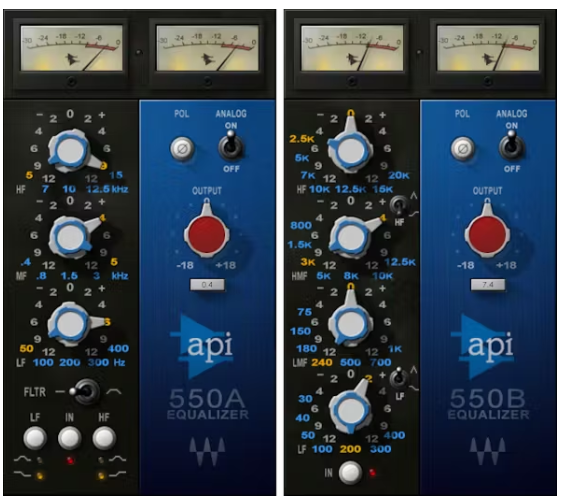
Pros:
- Punchy API Character: Adds a distinct, forward, and dynamic sound to tracks.
- Proportional Q: Makes boosts and cuts sound more natural and musical.
- Great for Drums and Guitars: Excels at adding punch and definition to rhythmic and mid-range instruments.
- Frequent Sales: Regularly available at very attractive prices during Waves sales.
Cons:
- Fixed Frequencies: Like Pultecs, you’re limited to the specific frequency points.
- Not for Surgical Work: Best used for broad tonal shaping rather than precise problem solving.
- Can Be CPU Intensive: As with many analog emulations, monitor CPU use on larger projects.
Official Link: https://www.waves.com/plugins/api-550 (Check Waves website for current sales)
4. Plugin Alliance Maag EQ4
Famous primarily for its unique “Air Band,” the Maag EQ4 (developed by Plugin Alliance) is a 6-band equalizer based on the design by Cliff Maag. It’s another plugin frequently featured in Plugin Alliance’s numerous sales, making it very affordable.
Description: The EQ4 features four active bands (Sub, 40Hz, 160Hz, 650Hz, 2.5kHz) and its signature passive “Air Band” filter with selectable frequencies (2.5kHz, 5kHz, 10kHz, 15kHz, 20kHz, 40kHz). The Air Band is particularly praised for adding silky, open high-end without harshness.

Pros:
- Unique Air Band: Excellent for adding sparkle and presence to vocals, acoustic instruments, or the overall mix without sounding brittle.
- Simple and Effective: Easy to dial in great-sounding results quickly.
- Musical Bands: The fixed bands are well-chosen for general tonal shaping.
- Frequent Sales: Plugin Alliance often runs sales that make this plugin highly affordable.
Cons:
- Limited Control: Not a parametric EQ, so you can only adjust gain at fixed points.
- Specific Use Case: While versatile, it’s often primarily sought after for its Air Band.
Official Link: https://www.plugin-alliance.com/en/products/maag_eq4.html (Check Plugin Alliance website for current sales)
5. Waves SSL E-Channel / SSL G-Channel
Emulating the channel strip EQs from classic Solid State Logic consoles, the Waves SSL E-Channel and G-Channel plugins are industry standards for mixing. While available individually, they are often bundled or heavily discounted during sales, bringing them into a budget-friendly territory. We’ll focus on the EQ sections here.
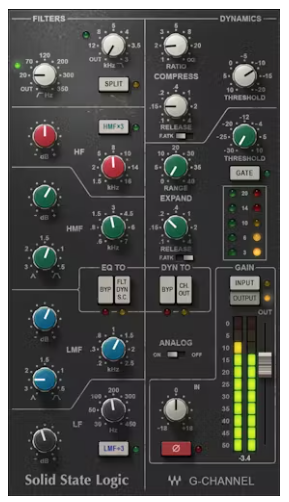
Description: These plugins replicate the E and G series console channel strips, including their distinct 4-band EQs. The E-Channel EQ is known for being more precise and aggressive, while the G-Channel EQ is often described as smoother and more musical. Both include versatile high-pass and low-pass filters.
Pros:
- Industry Standard Sound: Provides the punch, clarity, and character associated with classic SSL consoles.
- Versatile for Mixing: Excellent for shaping individual tracks (drums, vocals, guitars, etc.) within a mix context.
- Filter Options: Includes useful high and low-pass filters for cleaning up tracks.
- Frequent Sales: Very often available at deep discounts from the Waves website.
Cons:
- Can Be CPU Intensive: Running many instances can add up, especially using the full channel strip.
- Less Transparent: They impart the SSL console character, which may not be desired for entirely clean processing.
Official Link: https://www.waves.com/plugins/ssl-g-channel and https://www.waves.com/plugins/ssl-e-channel (Check Waves website for current sales)
Conclusion
You don’t need to invest in the most expensive plugins to achieve professional-sounding mixes. The plugins listed above represent some of the best value available on the market today. From the powerful and free TDR Nova to character-rich analog emulations frequently available at low prices, these tools can help you sculpt your sounds effectively and musically. Experiment with demos where available and keep an eye out for sales – your wallet (and your tracks) will thank you!
Tags:

